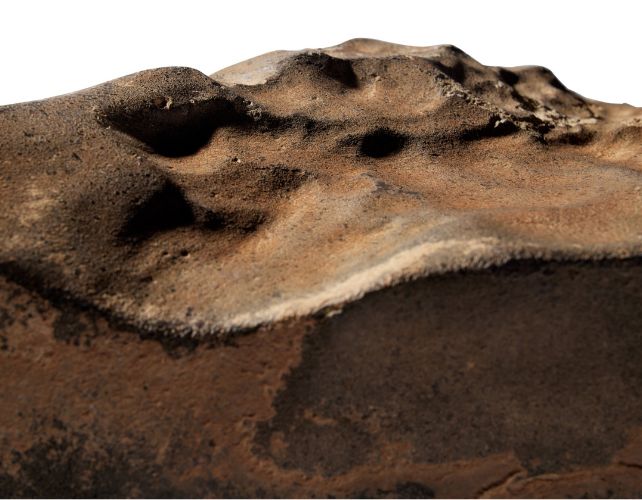The largest individual Martian rock ever found on Earth has sold at a Sotheby's auction for almost US$5.3 million, to an anonymous bidder.
This massive chunk of Mars is a meteorite named NWA-16788, and at 24.67 kilograms (54.39 pounds), it towers over the previous record-holder, Taoudenni 002, a meteorite weighing 14.51 kg found in Mali back in 2021.
The Sotheby's auction opened on July 16 at 14:00 UTC, and closed just under five hours later, at 18:46 UTC. Prior to the event, the value of this scientific marvel was estimated to be between $2 million and $4 million, but ultimately it sold for $5.296 million.
The Martian rock's pristine condition and rich history likely led to it surpassing expectations.
NWA-16788 "shows minimal terrestrial weathering, indicating that its physical and chemical makeup have not been significantly altered since its arrival in the Sahara Desert," the Sotheby's listing explains.
"In other words, NWA-16788 is likely a relative newcomer here on Earth, having fallen from outer space rather recently."
The rock was likely sent careening into Earth when an asteroid forcefully crashed into its home planet, based on the presence of a few shock-melted areas, and the fact that around a fifth of its make-up is a glass called maskelynite, which forms when feldspar is transformed through intense heat and pressure.
The Sotheby's listing states the meteorite was "formed from the slow cooling of Martian magma and [is] characterized by a coarse-grained texture composed primarily of pyroxene, maskelynite, and olivine."
These micro-gabbroic qualities make it particularly rare: only 5.4 percent of Mars meteorites are classified as such.
It was discovered by a meteorite hunter in the Agadez region of Niger, in November 2023. A small sample was sent to the Shanghai Astronomy Museum, where its Martian identity was confirmed.
Related: Man Keeps a Rock For Years Hoping It's Gold. It Turns Out to Be Far More Valuable.
 A close-up of the very expensive rock. (Sotheby's)
A close-up of the very expensive rock. (Sotheby's)The auction raised mixed feelings from the scientific community, with some questioning whether we should really put a price-tag on such a rare specimen.
"It would be a shame if it disappeared into the vault of an oligarch," paleontologist Steve Brusatte from the University of Edinburgh told Jack Guy at CNN, before the auction took place. "It belongs in a museum, where it can be studied, and where it can be enjoyed by children and families and the public at large."
Meanwhile, University of Leicester planetary scientist Julia Cartwright gave CNN a different opinion: "The scientific interest will remain, and the new owner may be very interested in learning from it, so we may still gather lots of science from this."
But with the successful bidder's identity concealed, the fate of this very expensive rock is uncertain.

.jpg) 14 hours ago
1
14 hours ago
1
 English (US)
English (US)